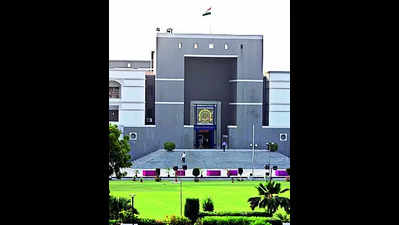- News
- City News
- ahmedabad News
- HC fumes over mamlatdar’s order on hiring a lawyer
Trending
HC fumes over mamlatdar’s order on hiring a lawyer

The reason for the court stopping the mamlatdar from proceeding on the notice was the latter’s decision of not allowing the 10 people to hire a lawyer.
On June 26, the mamlatdar sent them the notice through a WhatsApp message, asking them to remain present for a hearing on July 3 to explain why their transaction should not be cancelled since they had bought agricultural land without requisite permissions and in violation of the existing land laws.
Besides challenging the notice on merit, the petitioners’ advocate Ronith Joy drew the court’s attention to the recital in the notice that only the infirm and the illiterate can hire a lawyer to represent themselves before the mamlatdar, collector or tribunal. Others are not entitled to have themselves represented by a lawyer.
On noticing this, Justice Nikhil Kariel questioned the govt lawyer present in the courtroom, “From where does he get that discretion? Where does the law provide that only those who are uneducated, infirm and incapable are entitled to advocates? Which law says that only such persons can hire advocates? From where the mamlatdar gets this knowledge?”
When the petitioner’s advocate urged the court to stop the mamlatdar from conducting proceedings on July 3, the judge posted a further hearing of the matter on July 8 and told the govt lawyer, “Make sure that nothing happens till then.”
We also published the following articles recently
Govt to send e-notices from July 1
Goa implements the Goa Act 16 of 2022 on July 1, allowing electronic warning notices to citizens. This initiative addresses manpower shortage and recipient location issues, streamlining the notice delivery process.
Goa implements the Goa Act 16 of 2022 on July 1, allowing electronic warning notices to citizens. This initiative addresses manpower shortage and recipient location issues, streamlining the notice delivery process.
Bengal lawyers protest 3 new criminal laws
Lawyers in West Bengal protested new criminal laws by abstaining from work and wearing black badges. The state's bar council urged observance of July 1 as a 'black day', but the high court clarified that lawyers were not compelled to strike. This demonstration highlighted the legal community's concerns about the laws.
Lawyers in West Bengal protested new criminal laws by abstaining from work and wearing black badges. The state's bar council urged observance of July 1 as a 'black day', but the high court clarified that lawyers were not compelled to strike. This demonstration highlighted the legal community's concerns about the laws.
How to file petition and argue in court? Lawyers scan books
Legal practitioners, including Manish Shandilya, Rajiv Kaushik, and Jagrup Singh, face challenges adapting to the new BNS laws. The transition involves navigating unfamiliar legal provisions, requiring guidance and training for effective implementation in court proceedings.
Legal practitioners, including Manish Shandilya, Rajiv Kaushik, and Jagrup Singh, face challenges adapting to the new BNS laws. The transition involves navigating unfamiliar legal provisions, requiring guidance and training for effective implementation in court proceedings.
End of Article
FOLLOW US ON SOCIAL MEDIA










